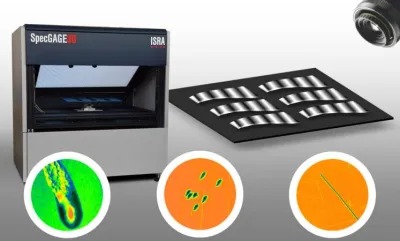Components with reflective or partially reflective surfaces are on the rise in premium automotive manufacturing. In order to meet the challenging requirements of geometric quality and aesthetic appearance, automated inspection systems are indispensable. With its SpecGAGE3D product line, ISRA VISION offers the optimum solution for inspecting the quality of reflective surfaces.
Appearance is crucial, as it increases the value of a vehicle. Interior components, including the surfaces of decorative parts and coverings, also determine whether vehicles leave a long-lasting impression. Eye-catching decorative parts, for example, are used on B pillars, sunroofs, switches and trims. The parts used are most commonly produced by injection molding and feature decorative, reflective surfaces that are intended to look beautiful and flawless.
Accordingly, the quality demands placed on glossy and reflective surfaces are very high. Even the tiniest defects on reflective surfaces catch the eye. When choosing which car to buy, customers often rely on the impression they gain within the first few seconds. After all, buyers expect 100% defect-free surfaces on their new car.
Challenge: Inspection of Reflective Surfaces
In addition to being cumbersome and expensive, manual inspection of reflective parts is also very prone to errors. The inspection results depend heavily on the performance of the persons conducting the inspection that day. When fatigue enters the equation over the course of the working day, this will inevitably lead to inconsistent results. That is why more and more manufacturers are opting for automated inspection solutions. Up to now, however, reflective surfaces represented an insurmountable obstacle in this endeavor.
These surfaces are particularly difficult to inspect given the fact that common inspection methods are based on diffuse reflection, which means that their results cannot be applied to reflective or partially reflective surfaces. Users subconsciously evaluate the quality of surfaces based on their reflective properties, resulting in major challenges for manufacturers of such surfaces.
100% Defect Detection – Fast, Objective and Traceable
 ISRA VISION’s SpecGAGE3D systems are the ideal solution for overcoming these challenges, reliably detecting paint defects, inclusions, spray errors and other defects even on high-gloss components. The inspection systems in this product line ensure objective and traceable inspection of injection-molded plastic parts, as well as components made from glass or aluminum. They guarantee 100% defect detection in both individual measurements and the simultaneous inspection of several parts, which ideally can remain in the tray during the process. In addition, the systems boast a high product throughput thanks to the quick measurement of components.
ISRA VISION’s SpecGAGE3D systems are the ideal solution for overcoming these challenges, reliably detecting paint defects, inclusions, spray errors and other defects even on high-gloss components. The inspection systems in this product line ensure objective and traceable inspection of injection-molded plastic parts, as well as components made from glass or aluminum. They guarantee 100% defect detection in both individual measurements and the simultaneous inspection of several parts, which ideally can remain in the tray during the process. In addition, the systems boast a high product throughput thanks to the quick measurement of components.
The SpecGAGE3D product line ensures the automated measurement and inspection of curved and planar objects with reflective surfaces. Defects such as inclusions, spalling, spots and paint runs are reliably detected. In addition, SpecGAGE3D checks the shape and curvature of the components, using automatic CAD comparison to ensure both process stability and product quality. Top speed combined with reliability provides maximum efficiency – all while keeping costs low. The product line also includes quality inspection systems for large components, transparent surfaces and curved reflective surfaces, as well as systems for robot-guided inspection.
The Deflectometry Measuring Principle
All SpecGAGE3D systems work on the measuring principle of deflectometry, which is the best way to inspect reflective and partially reflective surfaces. The system projects stripe patterns onto the reflective surfaces to be inspected, before the reflected pattern is captured by up to 12 cameras at different angles and evaluated.
The recorded image sequence and photogrammetric methods are all that is required to reconstruct the object geometry. Surface defects cause deviations in the stripe pattern, and the resulting irregularities in their reflection provide information on the surface conditions and potential surface defects. Deflectometric systems are characterized by enhanced sensitivity towards changes in inclination. Errors are detected and – if known – classified straight away.
Production Compatible With Industry 4.0
The system’s sensitivity greatly surpasses human perception, reliably detecting surface defects that are also perceived as disruptive by the human eye. Even if a human observer describes a given object as flawless, SpecGAGE3D might come to an entirely different conclusion – depending on the specification in question.
The deflectometry system can be used both inline and offline. The classification enables reliable traceability that allows process errors to be eliminated, overall quality enhanced and rejection rates minimized.
ISRA VISION’s portfolio of production analytics tools perfectly complements the inspection system. The Enterprise PROduction Management Intelligence Software EPROMI uses the production line’s entire data set to provide transparency and an overview of manufacturing processes. The collected inspection data then serves as a basis for optimizing process parameters, ensuring that defective and deformed components are detected immediately.
In addition to increased product quality, manufacturers benefit from a unique combination of cutting-edge sensor technology, connectivity, and superior software expertise – creating the basis for the digital transformation and Industry 4.0 production processes.
For more information: www.isravision.com
Tags: 3d vina, hiệu chuẩn, hiệu chuẩn thiết bị, máy đo 2d, máy đo 3d, máy đo cmm, Optimized Inspection of Reflective Surfaces, sửa máy đo 2d, sửa máy đo 3d, sửa máy đo cmm
